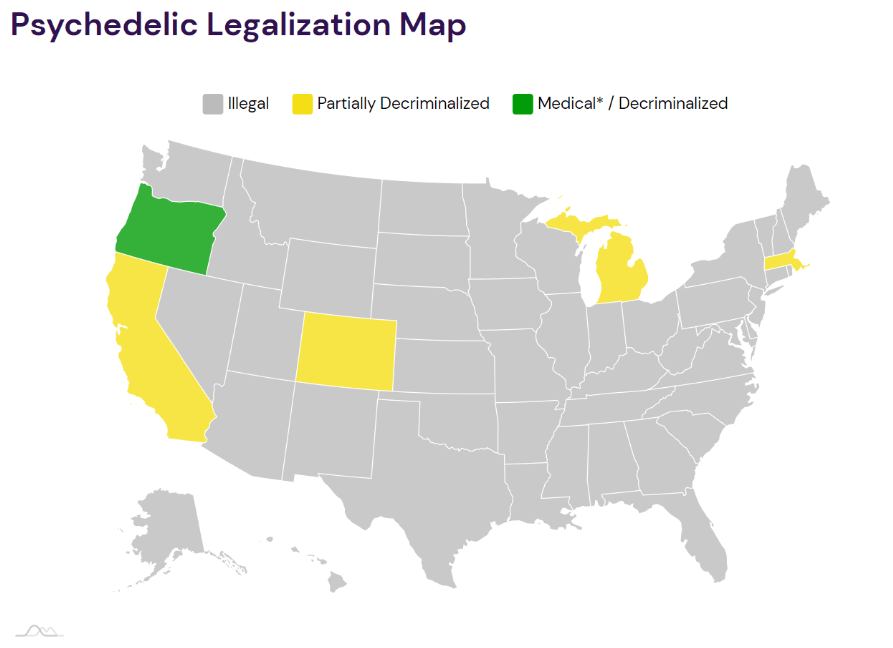Market Outlook into the Psychedelic Industry
 Market Outlook into the Psychedelic Industry 2023
Market Outlook into the Psychedelic Industry 2023 Historical Clues
In recent years, the field of psychedelic medicine has experienced a period of hyperbolic growth, ballooning to a market size of over $4 billion in 2021, with projections to reach nearly $11 billion by 2027. [1] Not long ago, psychedelics, a class of substances associated with hallucinations and altered states of consciousness, were widely viewed as dangerous.
Psychedelics were studied in clinical settings as early as the 1950s, but the cultural and political factors of that era led to the abandonment of the research and its scope. [2] During that period, psychedelic compounds existed primarily as recreational substances rather than as potential medicines.
The resurgence of psychedelic studies has revived the idea of psychedelics having the potential for medicinal purposes. The general shift in perspective surrounding psychedelics was informally dubbed by many as the ‘psychedelic renaissance’.[3]
Thus began the growing focus on psychedelic medications with the potential to treat a variety of ailments, ranging from physical pain and discomfort to anxiety, depression, and schizophrenia. Proponents of psychedelic medicines claim that they have the potential to treat disorders effectively with fewer side effects compared to modern allopathic prescriptions. [4]
Industrialization of Psychedelic Medicine
Many startups dedicated to the advancement of psychedelic medicines have been founded in the past few years. Hoping to capitalize on this surge of interest, venture capitalists have invested nearly $140 million in early-stage startups in recent years. [5]
From an investing standpoint, this is an appealing time to invest in psychedelic startups that have the potential to disrupt the multi-billion dollar pharmaceutical industry. But like in any emerging industry, investors need to be well informed on the specifics of any psychedelic company before making financial decisions.
Most psychedelic companies seek to develop new psilocybin-based drugs. This chemical compound is present in selective mushroom species and is responsible for the psychoactive effects of LSD and MDMA. [6]
Psilocybin has a range of medically accepted uses, with the FDA recently approving the use of a psilocybin-based drug in the treatment of eating disorders. [7] Depression, OCD, anxiety, autism, substance addiction, and fibromyalgia are only some of the ailments that the psychedelic companies are targeting with psilocybin. [8]
Despite its popularity, psilocybin is not the only chemical compound associated with psychedelic startups. Many psychedelic companies are dedicated to researching and implementing other compounds from the hallucinogenic family into new groundbreaking drugs. Like psilocybin, these new compounds have the potential to treat a wide range of neurological issues. [9]
Even traditional pharmaceutical and therapeutic companies are getting involved in emerging psychedelics. Notably, mental care company COMPASS Pathways acquired intellectual rights to a catalog of novel psychedelic compounds. [10]
This acquisition represents one of the most considerable advantages of synthesizing new psychoactive compounds: the ability to patent them. Developing an entirely new compound for use in trial psychedelic medicines is a significant source of value to companies and investors alike, as shown by the COMPASS Pathways’ purchase.
Furthermore, this purchase signifies that interest in the psychedelic industry is not limited to early-stage startups. Traditional pharmaceutical giants are more than willing to invest in psychedelic ventures in hopes of crafting the next breakthrough medication.
The Startup Environment
The psychedelic industry is relatively new, and many psychedelic companies are still in the startup stage. In this stage, companies seek to secure funding from potential investors to cover the operational costs of the company. Promising companies can host fundraising rounds from private investors or take their company public to be traded on the stock market.
For investors, startups offer a high-risk high-reward investment opportunity. Startups have less financial security and credibility than established companies. However, they often have a higher growth potential than companies that have existed for decades.
As the psychedelics industry matures, it is likely that successful startups will grow and transition into more traditional companies while those struggling will have to wind down. The mission of every investor in the psychedelics space should focus on finding companies that have a high potential to survive the startup phase.
A few successful leaders have already emerged in the psychedelics field. Public and private investors have pledged millions to companies like MindMed, GH Research, and Cybin. Although these companies have jumped out to an early lead, there is still plenty of room for enterprising startups to enter the market.
Industry Niches
Understandably, drug development is a key area of interest for many psychedelic companies. The ability to synthesize psychoactive compounds and develop them into novel medicines is the end goal of these organizations.
Psychedelic research and development firm Atai Life Sciences recently launched a new division dedicated to the discovery of new chemical compounds that can be used in mental health treatments. [11]
For investors, companies devoted to finding and developing new compounds to be used in psychedelic medicines are one of the most enticing opportunities on the market. Venture firms have the opportunity to invest in companies at all stages of drug development, including cultivation, research, lab work, clinical trials, marketing, and sales.
Despite the promising level of growth in the field of psychedelics, it is critical to note that the average failure rate in the drug development process is 96 percent. [12] To better understand psychedelic startups and make informed investment decisions, investors need to be informed and aware of every niche the company operates.
For example, Numinus administration clinics perform a vastly different service than MindMed clinical trials, but both companies exist under the wide blanket of the psychedelic medicine industry.
Outside of drug development companies, biotech, and therapeutics companies are researching ways to use existing compounds to treat mental illness.
A lesser-known division of the psychedelics industry is devoted to improving the process of administering and taking medication. These destinations are commonly known as psychedelic retreats and combine aspects of traditional vacations with psychedelic experiences.
The most popular psychedelic drug in these destinations is ayahuasca, a herbal concoction administered in ritual-like settings. This highly hallucinogenic mixture is popular for its reported ability to provide users with a chance for spiritual and emotional healing. [13]
Retreats offer customers a safe and supervised environment to use psychedelic drugs in the presence of safety professionals. Retreats are an effective method of deconstructing much of the stigma that still exists around psychedelics.
Policy
A major factor fueling the growth of the psychedelic industry is the relaxed federal policy from agencies like the DEA and FDA. On October 14th, 2022, the DEA called for massive increases in the production of psychedelic plants to meet research quotas for new medicines. [14]
The shift in federal policy in favor of increased psychedelic research is a welcome sign for the private sector, which is less likely to be hampered by restrictive legislation that existed in the past.
However, some regulatory concerns still remain. In 2021, 65 percent of surveyed voters responded that psychedelics possess no medical significance. [15] Despite mountains of scientific evidence stating otherwise, many Americans do not recognize the medical value of psychedelics.
U.S. legislators largely share this view on psychedelics, with only select states enacting legislation to decriminalize and legalize psychedelic drugs. California, Oregon, Michigan, Colorado, and Massachusetts are currently the only states with a limited level of legalization for psychedelics. [16]
 Map of Psychedelic Legalization by State (Source:https://psychedelicinvest.com/psychedelic-laws/)
Map of Psychedelic Legalization by State (Source:https://psychedelicinvest.com/psychedelic-laws/) Upcoming Scope
The field of psychedelic medicine likely has significant staying power. Many promising psychedelic drugs are already in the final stages of development, while more and more lawmakers are signaling their willingness to expand psychedelic legalization. [17]
Media, marketing, podcasts, and educational companies are working to change public perception about psychedelics by bringing awareness to the benefits of psychedelic medicine. Research firms are employing scientists to discover novel chemical compounds to be used in new medication. These same medicines are undergoing clinical trials to perfect them for commercial consumers.
Together, psychedelic companies are bringing an exciting new change to the pharmaceutical industry.
The current landscape of the psychedelic business consists of a highly diverse network of startups and established organizations competing to fill roles in an emerging niche. There are many promising investment opportunities for investors willing to leverage the companies populating the market.


